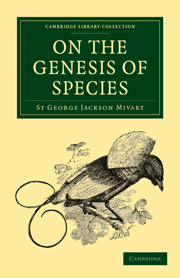Book contents
- Frontmatter
- Contents
- LIST OF ILLUSTRATIONS
- CHAPTER I INTRODUCTORY
- CHAPTER II THE INCOMPETENCY OF “NATURAL SELECTION” TO ACCOUNT FOR THE INCIPIENT STAGES OF USEFUL STRUCTURES
- CHAPTER III THE CO-EXISTENCE OF CLOSELY SIMILAR STRUCTURES OF DIVERSE ORIGIN
- CHAPTER IV MINUTE AND GRADUAL MODIFICATIONS
- CHAPTER V AS TO SPECIFIC STABILITY
- CHAPTER VI SPECIES AND TIME
- CHAPTER VII SPECIES AND SPACE
- CHAPTER VIII HOMOLOGIES
- CHAPTER IX EVOLUTION AND ETHICS
- CHAPTER X PANGENESIS
- CHAPTER XI SPECIFIC GENESIS
- CHAPTER XII THEOLOGY AND EVOLUTION
- INDEX
CHAPTER X - PANGENESIS
Published online by Cambridge University Press: 29 August 2010
- Frontmatter
- Contents
- LIST OF ILLUSTRATIONS
- CHAPTER I INTRODUCTORY
- CHAPTER II THE INCOMPETENCY OF “NATURAL SELECTION” TO ACCOUNT FOR THE INCIPIENT STAGES OF USEFUL STRUCTURES
- CHAPTER III THE CO-EXISTENCE OF CLOSELY SIMILAR STRUCTURES OF DIVERSE ORIGIN
- CHAPTER IV MINUTE AND GRADUAL MODIFICATIONS
- CHAPTER V AS TO SPECIFIC STABILITY
- CHAPTER VI SPECIES AND TIME
- CHAPTER VII SPECIES AND SPACE
- CHAPTER VIII HOMOLOGIES
- CHAPTER IX EVOLUTION AND ETHICS
- CHAPTER X PANGENESIS
- CHAPTER XI SPECIFIC GENESIS
- CHAPTER XII THEOLOGY AND EVOLUTION
- INDEX
Summary
In addition to the theory of “Natural Selection,” by which it has been attempted to account for the origin of species, Mr. Darwin has also put forward what he modestly terms “a provisional hypothesis” (that of Pangenesis), by which to account for the origin of each and every individual form.
Now, though the hypothesis of Pangenesis is no necessary part of “Natural Selection,” still any treatise on specific origination would be incomplete if it did not take into consideration this last speculation of Mr. Darwin. The hypothesis in question may be stated as follows: That each living organism is ultimately made up of an almost infinite number of minute particles, or organic atoms, termed “gemmules,” each of which has the power of reproducing its kind. Moreover, that these particles circulate freely about the organism which is made up of them, and are derived from all the parts of all the organs of the less remote ancestors of each such organism during all the states and stages of such several ancestors' existence; and therefore of the several states of each of such ancestors' organs. That such a complete collection of gemmules is aggregated in each ovum and spermatozoon in most animals, and in each part capable of reproducing by gemmation (budding) in the lowest animals and in plants. Therefore in many of such lower organisms such a congeries of ancestral gemmules must exist in every part of their bodies, since in them every part is capable of reproducing by gemmation.
- Type
- Chapter
- Information
- On the Genesis of Species , pp. 208 - 219Publisher: Cambridge University PressPrint publication year: 2009First published in: 1871

